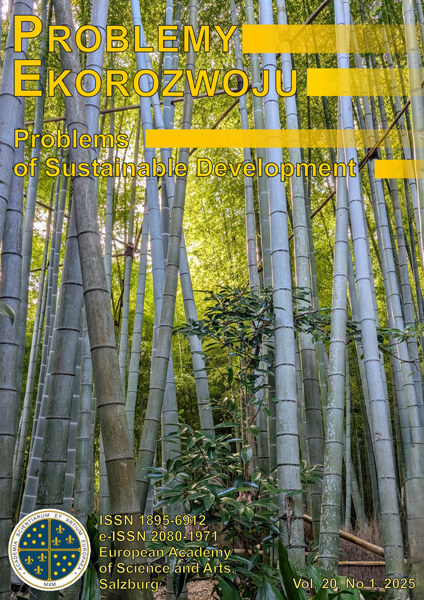Koncepcje kognitywnego modelowania zrównoważonego rozwoju społeczeństwa
Elina Boichenko
Institute of Economic and Legal Studies of the National Academy of Sciences of Ukraine, Department of Problems of Inter-regional Cooperation Issues, 60 Shevchenko blvd., zip code: 01032, Kyiv, Ukraine (Ukraina)
https://orcid.org/0000-0003-1121-7160
Nataly Martynovych
Institute of Economic and Legal Studies of the National Academy of Sciences of Ukraine, Department of Problems of Inter-regional Cooperation Issues, 60 Shevchenko blvd., zip code: 01032, Kyiv, Ukraine (Ukraina)
https://orcid.org/0000-0001-9884-6052
Iryna Shevchenko
Simon Kuznets Kharkiv National University of Economics, 9-A Nauki Ave., zip code: 61166, Kharkiv, Ukraine (Ukraina)
https://orcid.org/0000-0001-8188-3551
Abstrakt
W czasie szybkiego postępu naukowo-technicznego, będącego wynikiem rozwoju nauki i techniki oraz procesu gromadzenia i tworzenia nowej wiedzy, prowadzone są badania naukowe, zachodzą zmiany informacyjne i technologiczne. Postęp naukowo-techniczny zaowocował nowymi formami i metodami organizacji produkcji, wprowadził nową technologię, zautomatyzował procesy produkcyjne, przyspieszył tempo cyfryzacji wszystkich sfer społeczeństwa itp. Społeczeństwo informacyjne stwarza warunki do dywersyfikacji struktury produkcji i konsumpcji, zmieniając tym samym potrzeby społeczeństwa, zachęcając producentów do tworzenia coraz większej ilości nowych dóbr i usług. Jednak wraz z rozwojem zaawansowanych technologii następuje gwałtowne niszczenie przyrody, rośnie także zanieczyszczenie środowiska. Artykuł konretyzuje społeczno-ekologiczne aspekty zrównoważonego rozwoju w oparciu o modelowanie poznawcze, a także sugeruje konkretne działania, które mogą przyczynić się do realizacji określonych celów Międzynarodowej strategii zrównoważonego rozwoju 2030. Udowodniono, że technologie technogeniczne prowadzą do powstania zagrożeń, których istnienie potwierdza istnienie związku przyczynowego między obciążeniem technogenicznym środowiska a stanem zdrowia publicznego. Uzasadniona jest konieczność diagnostyki ekologicznego i bezpiecznego rozwoju populacji, mającej na celu identyfikację wybranych parametrów zagrożenia technogenicznego w zmieniającej się rzeczywistości społeczno-gospodarczej.
Słowa kluczowe:
ekologia, ryzyka technogeniczne, system technogeniczny, ekonomia, społeczeństwo, biznes, zrównoważony rozwój, modelowanie kognitywneBibliografia
BLINOVA N., MOKHONKO V., 2009, Environmental standardization and certification, Luhansk.
Google Scholar
Development program of the Organization of the United Nations, https://www.ua.undp.org/content/ukraine/uk/home/ourwork/sdg-overview.html (21.02.2021).
Google Scholar
DVORNIK M., 2013, Essence and problems of information society development in Ukraine, Sustainable development of the economy, 4: 75-79.
Google Scholar
Find out everything, 2020, https://uznayvse.ru/interesting-facts/samiye-strashniye-ehnogenniyekatastrofi.html (20.12.2020).
Google Scholar
GRADOVSKY V., 2003, The Influence of the environmental situation on the state of human health in Zhytomyr region, Ecological bulletin, 9 (10): 22-24.
Google Scholar
Institute of Industrial Economics, 2021, https://us02web.zoom.us/rec/share/6yrR5sV8mK6AIF8llqR2a2_4Ei_bnaLPFlo7H7SyPNcKOJzUHdg_29wqkWcaRn0.6ito5apimJfWYrc (7.02.2021).
Google Scholar
MACHLUP F., 2000, Production and Distribution of Knowledge in the United States, NOP, Princenton.
Google Scholar
MASUDA Y., 1981, The Information Society as Post-Industrial Society: World Future Society, Transaction Publishers, Tokyo.
Google Scholar
NESTEROVA O., POZHARNITSKAYA O., 2018, Assessing well-being from the perspective of sustainable human development: the possibilities of international indices, Issues of innovative economy, 8 (3): 335-347.
Google Scholar
NYUKHNYA I., 2012, The system of socioeconomic indicators for assessing the level of public welfare, Socio-economic phenomena and processes, 12 (46): 245-251.
Google Scholar
Official portal of the Verkhovna Rada of Ukraine, 2021, http://zakon4.rada.gov.ua/laws/show/1264-12. (16.01.2021).
Google Scholar
PAWŁOWSKI А., 2015, Zasada, czy zasady, zrównoważonego rozwoju? Wschodni rocznik humanistyczny, 11: 85-96.
Google Scholar
Popular mechanics, 2020, https://www.popmech.ru/technologies/10977-kak-vse-eto-sluchilos-meksikanskiy-zaliv/ (11.12.2020).
Google Scholar
Report World Commission on Environment and Development ‘Our Common Future’ https://www.un.org/ru/ga/pdf/brundtland.pdf (21.02.2021).
Google Scholar
SCHWAB K., 2016, The Fourth Industrial Revolution, Eksmo, New York.
Google Scholar
SENGE P. M., SMITH B., SCHLEY S., LAURE J., KRUSCHWITZ N., 2008, The Necessary Revolution: How Individuals and Organizations Are Working Together to Create a Sustainable World, 2st ed., Crown Business, New York.
Google Scholar
SIENENHUNER B., 2000, Homo sustinens – Towards a New Conception of Humans for the Science of Sustainability, Ecological Economics, 32: 15-25.
DOI: https://doi.org/10.1016/S0921-8009(99)00111-1
Google Scholar
Skowroński, A. 2003, Wartości ekologiczne dla zrównoważonego rozwoju, Filozoficzne i społeczne uwarunkowania zrównoważonego rozwoju, ed. Pawłowski A., Komitet Inżynierii Środowiska PAN, Lublin, 16: 25-32.
Google Scholar
SOLDAK M., 2020, Industrial ecosystems and digitalization in the context of sustainable development, Industrial Economics, 4 (92): 38-64.
DOI: https://doi.org/10.15407/econindustry2020.04.038
Google Scholar
VASILENKO V., BLAGODARNY A., BOYCHENKO E., 2012, Diagnostics of regional development: types, approaches, techniques, ed. Vasilenko V., National Academy of Sciences of Ukraine Institute of Economic and Legal Sciences, South-East, Donetsk: 558.
Google Scholar
World Health Organization, 2020, The top 10 causes of death, https://www.who.int/ru/newsroom/fact-sheets/detail/the-top-10-causes-ofdeath (07.12.2020).
Google Scholar
ZERKALOV D., TKACHUK K., 2011, Engineering ecology: problems, monitoring, management, The foundation, Kiev: 580.020).
Google Scholar
Autorzy
Elina BoichenkoInstitute of Economic and Legal Studies of the National Academy of Sciences of Ukraine, Department of Problems of Inter-regional Cooperation Issues, 60 Shevchenko blvd., zip code: 01032, Kyiv, Ukraine Ukraina
https://orcid.org/0000-0003-1121-7160
Autorzy
Nataly MartynovychInstitute of Economic and Legal Studies of the National Academy of Sciences of Ukraine, Department of Problems of Inter-regional Cooperation Issues, 60 Shevchenko blvd., zip code: 01032, Kyiv, Ukraine Ukraina
https://orcid.org/0000-0001-9884-6052
Autorzy
Iryna ShevchenkoSimon Kuznets Kharkiv National University of Economics, 9-A Nauki Ave., zip code: 61166, Kharkiv, Ukraine Ukraina
https://orcid.org/0000-0001-8188-3551
Statystyki
Abstract views: 88PDF downloads: 43
Licencja

Utwór dostępny jest na licencji Creative Commons Uznanie autorstwa – Na tych samych warunkach 4.0 Miedzynarodowe.









